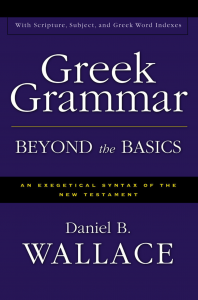Greek Grammar Beyond the Basics: Exegetical Syntax of the New Testament
Daniel B. Wallace. Grand Rapids, Michigan: Zondervan, 1996.
ISBN: 978-0310218951
The Greek Grammar Beyond the Basics is one of the finest works ever written on Greek syntax. Daniel Wallace is a renowned scholar with numerous achievements and rich legacy. This book has been a standard on Greek syntax and is widely used by schools and individuals worldwide. It represents the intermediate Greek level (2nd semester) and assumes a proficiency in the beginning Greek (morphology – 1st semester).
Summary and main points
Wallace produced a detailed work in which he attempts to cover all nuances of the NT syntax. Above all, he shows that words bear various syntactical functions within sentences. As a result, they play different roles. Consequently, it is vital for an exegete (student, pastor) to recognize an appropriate role of each word and categorize it accordingly.
Throughout the book, Wallace offers numerous syntactical categories describing use of words in different contexts. He starts with syntax of nouns and nominals. His systematic arrangement of Greek cases is matchless. Furthermore, he covers the syntax of articles, adjectives, pronouns, and prepositions. In the same vein, a big portion of the book explains the verbs (tenses, voice, mood, etc) and the syntax of clauses. The strength of the book are the numerous examples from the Bible (Greek-English). At the end, the book offers the subject index and the scripture index so it is easy to navigate through the material.
Personal opinion
As I mentioned earlier, the book has been the flagship in Greek syntax. The biggest strength of the book is its systematic approach. For instance, the book is well organized and logically presented. It has numerous subheadings so it’s easy to find material which you need. In brief, it is user friendly. This single factor puts this volume above Moule’s An Idiom-book of New Testament Greek. In addition, Wallace uses examples from every book of the New Testament. Thus, the scripture index becomes handy in finding syntactical discussions on any particular text.
Moreover, the author incorporates recent discussions on verbal aspect and Aktionsart. He attempts to combine the aspect and temporality of Greek tenses which users will appreciate. Finally, Wallace does not limit his book to the syntax within clauses. He expands it beyond the level of a clause and seeks to explain how clauses relate to each other. In this light, the final chapters prepare a reader for further studies in the discourse analysis. This is commendable.
It is worthy to note that the book comes in two forms: the full (860 pages) and the abridged (340 pages).
Conclusion
This book cannot be overestimated. It is the standard which will be hard to replace. It is an absolute MUST for anyone who studies the Bible and wants to know its tiniest nuances. Pastors, seminary students, professors, and lay members will benefit from it tremendously. I highly recommend it to anyone.
Recommended: Yes
My Rating: 5
Check the Amazon Rating
